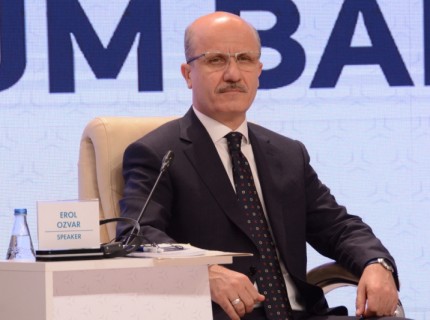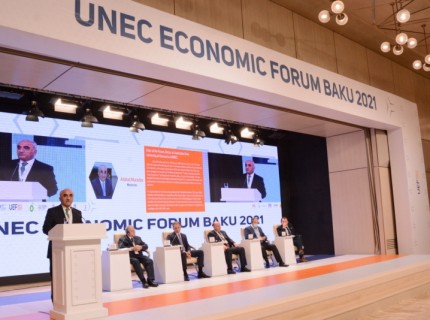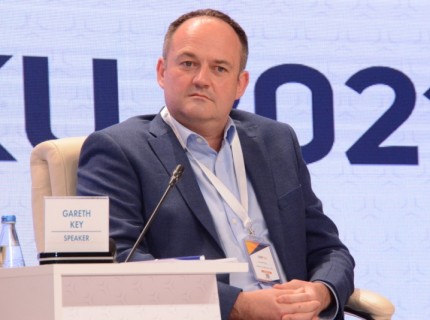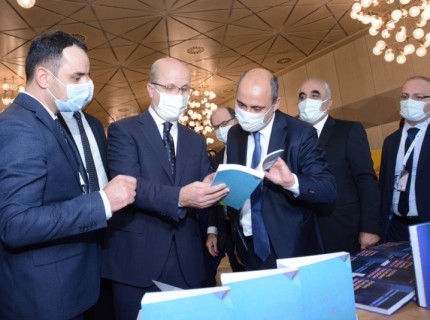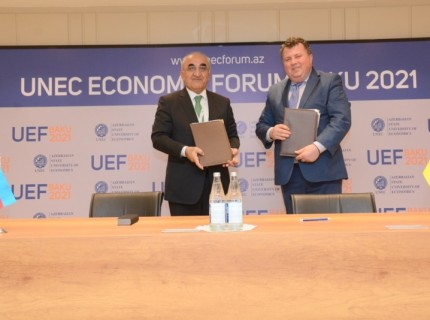Second day of UNEC Economic Forum: “Science and education in the post pandemic period” and “Digital transformation of the economy”
UNEC Economic Forum, dedicated to the 30th anniversary of the restoration of state independence, organized by Azerbaijan State University of Economics (UNEC) with the support of the Ministries of Education and Economy of the Republic of Azerbaijan, continued its work on December 2, 2021.
The forum was attended by Farah Aliyeva the head of Humanitarian Policy, Diaspora, Multiculturalism and Religious Affairs Department of the Administration of the President of the Republic of Azerbaijan, Emin Amrullayev, Minister of Education, Adalat Muradov, the rector of UNEC, Aziz Sanjar, Nobel Laureate, Erol Ozvar, president of Turkish Council of Higher Education , Munich Research University Professor of the Institute of Education Masud Efendiyev, heads of government agencies, MPs, foreign and local experts on science and education.
The memory of the martyrs was commemorated and the national anthem was played at the opening of the panel on “Science and education in the post pandemic period.”
Welcoming the forum participants, UNEC Rector Professor Adalat Muradov said that the panel was dedicated to the scientific approach to science and education in the post-Covid period. Noting that the pandemic has changed attitudes to science and education and raised many questions about the future, the rector said that in the first period of the crisis, the idea was formed that the transition to distance education would solve the existing problems. “The step taken in the education system as a whole gives grounds to say that distance education is not accepted as a solution. Although distance education ensures the continuity of education, it is as if the “green light” has been given to individualism in science. There are new scientific communications about the future of science, and serious questions about their forms.” The rector said that the panels will discuss these issues, and the forum will serve as a platform to answer questions important for the future development of our country.
Then the Nobel Laureate, world-famous scientist, Professor Aziz Sanjar spoke about the problems created by the pandemic era for scientists. He said that at that time, research groups were constantly in scientific research, adding that employees worked in closed conditions and had serious psychological problems.
Speaking at the forum, Minister of Education Emin Amrullayev stressed the importance of the forum dedicated to the restoration of state independence and the Great Victory. He said that the country’s further activities in the field of science and education are connected with independence and victory. Speaking about the problems in the field of education in the post-pandemic period and ways to solve them, the Minister approached the issue through the model of state decision-making in the field of science and education. He analyzed the difference between emotional and rational decisions made during a pandemic, noting that rational decisions are based on more serious evidence. The Minister said that the main goal of education and science policy is to increase accessibility and quality in this area, to create equal opportunities for people from different social groups. Emphasizing the importance of forming a new vision of the quality of education, E. Amrullayev stressed the need for quality control mechanisms of the relevant government and other independent agencies. The Minister also announced the criteria for measuring the quality of higher education: “Currently, the solution of many problems depends on scientific progress and research. We must understand that resources are limited. With this limitation, we need to think about what areas to develop. We must start the process today so that we can see the results in 20-30 years. Knowledge and skills are sufficient conditions, the main thing is motivation. The pandemic has shown how fragile the value chains are in the world. ” The Minister said that one of the important issues of the pandemic period is the monitoring of the learning process of individual socio-economic groups.
The chairman of the Council of Higher Education of Turkey, Erol Ozvar, spoke about the impact of the pandemic on higher education. He said that the crisis, as in all areas, has created new habits in the field of education, and a change in the paradigm of higher education is inevitable. Noting that there is no alternative to distance education and it is characterized by a number of challenges, he said that the human factor in higher education should change. E. Ozvar also spoke about the requirements of the digital information society and digital economy: “As a result of the digital transformation, human resource requirements have changed. Digitalization has also brought about significant changes in employment. In accordance with the requirements of the labor market, higher education institutions should give more priority to training programs aimed at increasing digital skills.
Professor of the Institute of Education of the Research University of Munich, Germany Masud Efendiyev spoke about the role of science and education in the development of countries. He said that the role of education, science and culture is irreplaceable for the future of mankind, and that the most important factor in the education system and learning environment is the student. There is a saying, “I learned most of what I learned from teachers, more from colleagues, and most from students.” The scientist also spoke about the new habits created by the pandemic, the requirements of artificial intelligence and the V Industrial Revolution.
After the speeches, the panel speakers answered the questions of the participants.
The books “E-commerce and e-exports”, “Research methods in the social sciences”, “Digital marketing and social media” authored by UNEC scientists were presented at the forum. The books “E-commerce and e-exports”, “Research methods in the social sciences”, “Digital marketing and social media” authored by UNEC scientists were presented at the forum. It was noted that the textbooks “Digital Marketing and Social Media” and “Electronic Commerce and Electronic Export” written within the “SABAH” master’s project and used in the educational process are the first literature prepared in the Azerbaijani language. The main features of the book are that they reflect many features of the local, international private sector and academic base.
A cooperation agreement was signed between UNEC and Taras Shevchenko National University of Kyiv, Ukraine (TSNUK) at the forum.
The agreement signed between UNEC Rector Professor Adalat Muradov and Rector of Kyiv National University named after T.Shevchenko (TSNUK) Professor Volodymyr Bugrov provides for joint research experience and research, development of bachelor’s, masters and doctoral programs, expansion and development of student and academic exchanges, preparation and exchange of joint scientific publications.
Then Christian Rauscher, editorial director of SPRINGER met with researchers.
The forum continued with the 3rd panel speeches on “Digital Transformation of the Economy: New Challenges, New Opportunities” moderated by Harel Menashri head of the department of “Cyber” of Holon Technology University.
Speaking at the panel, Minister of Digital Development and Transport Rashad Nabiyev said the topics discussed at the forum were an important platform for the effective implementation of issues arising from the national priorities set by President Ilham Aliyev for the country’s development until 2030. The Minister spoke about ensuring the effectiveness of digital transformation in Azerbaijan and the contribution of digitalization to economic development: “The only way to ensure the development of society is the development of innovation and technology. The establishment of such a society in Azerbaijan is one of the main goals, and purposeful steps are being taken in this direction. The reality is that today the Azerbaijani economy is still dependent on natural resources. The main task before us is to shorten the time period by making maximum use of digital transformation. That ecosystem must be created to realize this vision. This path passes only through the rule of law, the existence of a healthy government, the creation of a stable infrastructure. Once these are ensured, we can unequivocally pay more attention to the development of science and education in the country.
Then, Turkish Deputy Minister of Labor and Social Security Lutfihak Alpkan spoke about the application of digital transformation in the business world. Touching upon the advantages of artificial intelligence, digital transformation, as well as the problems it creates, the Deputy Minister also announced the trends. He shared the experience of major countries in this area and conducted a comparative analysis.
Danil Kerimi, co-founder and chief operating officer of the Engelands Institute in Canada, spoke in detail about the shortcomings in the technology, as well as the efficient production of technological waste.
Gareth Key, BP’s Head of Systems Architecture, spoke about smart technologies and their applications in the oil and gas industry.
UNEC Economic Forum will continue its work on December 3.












